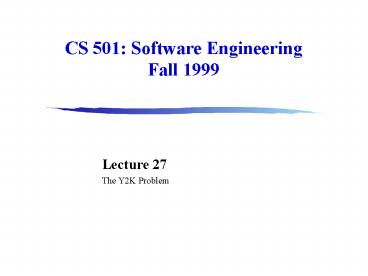CS 501: Software Engineering Fall 1999 - PowerPoint PPT Presentation
Title:
CS 501: Software Engineering Fall 1999
Description:
In 1967 memory cost $1 per byte. The Air ... 10 million new bugs introduced accidentally. security holes, errors, etc. introduced accidentally or deliberately ... – PowerPoint PPT presentation
Number of Views:43
Avg rating:3.0/5.0
Title: CS 501: Software Engineering Fall 1999
1
CS 501 Software EngineeringFall 1999
Lecture 27 The Y2K Problem
2
Administration
? Presentations Set-up time
3
Saving Memory
? In 1967 memory cost 1 per byte
The Air Force used single digit dates If
2-digit dates saved 1 of memory... savings
over 20 years 16 to 24 million per gigabyte ?
By 1980s, memory was much cheaper, but 2-digit
dates were standard. Why incur the
cost of changing standards? 1970 The mortgage
industry 1990 The Social Security
Industry moved towards 4-digit dates
4
Where's the Problem?
? A simple bug dates of the form 19xx have
been encoded xx ? A simple fix find every
occurrence of the bug modify the
code recompile Where's the problem?
5
Find Every Occurrence ...
? What computers do we use? data
processing control embedded systems personal
devices ? What programs do they run? in-house
development packages and libraries firmware,
microcode, hardware Who wrote this
program? Where is the source code?
6
Where's the Problem?
Computers fail everyday. What's special about
this bug? ? What if they all fail at the same
time? ? What if we lose telephone, electricity,
radio, etc.? ? Traffic signals, elevators, The
greatest worry is uncertainty.
7
Social Consequences
Worry creates its own problems ? Wal-Mart
forecasts lower profits in Q1 2000 ? Legislation
to limit law suits ? Opportunities for computer
fraud and sabotage ? Trading partners
8
Organizational Procedures
? Ostrich gt do nothing gt buy insurance ?
Bureaucratic gt fill in forms that programs are
compliant ? Subcontract gt hire Y2K
specialists ? Do it yourself gt in-house
computing department
9
Y2K Validation
Request from Library of Congress to confirm that
our code is Y2K compliant Our code is fine
.... but it depends on ... which depends on
... Yes. Our code is fine. Request from
DARPA to confirm that our code is Y2K compliant
It's been validated by another part of the US
government Thank you!
10
Technical Strategies
? Replacement noncompliant applications with
compliant ones (e.g., new versions of packages) ?
Repair noncompliant applications (e.g., in-house
applications) ? Terminate noncompliant programs
on an as-needed basis ? Mask the data exchange
between applications ? Object code interception
11
New Bugs
If it's not broke don't fix it. ? 10 billion
lines of code checked (often automatically) ? 10
million new bugs introduced accidentally ? ??
security holes, errors, etc. introduced
accidentally or deliberately
12
Is all the Money Going to Y2K?
Y2K is a great excuse to have the computing
budget increased ? Upgrade the operating
system ? Replace the old package ? Sell
something to your customers What boss will turn
turn a request for Y2K funds? What systems
administrators will not install Y2K upgrades?
13
Profiteering
? Buy gold, wood stoves, bottled water ? Y2K
specialists ? Pundits, consultants, writers ?
Religious cranks
14
Final Thoughts
We create computer systems that are more complex
than our understanding of them ? We over
estimate our ability to validate systems ? We
under estimate our ability to adapt and
respond Software engineering usually thinks of
systems as independent. Will the long-term
benefit of the Y2K problem be a greater
understanding of how software systems interact
with each other and with our social systems?
15
The End































